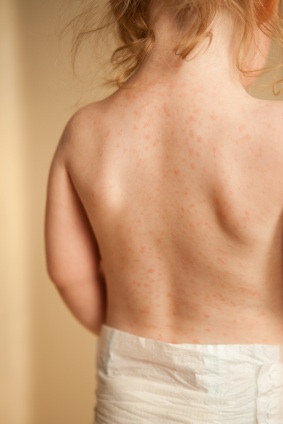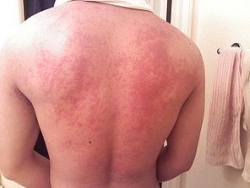Hives

Hives is an irritation of the skin that is characterized by itchy, swollen, inflamed welts that form on the exterior of the skin.
Hives can be caused by exposure to many different activities and substances, the most common of which are related to allergic reactions.
Hives can occur anywhere on the body and is generally not a dangerous disease. Though, if the problem goes untreated for long periods of time and does not subside, hives can leave lasting scars and other marks.
Alternative Names for Hives
Hives have several different names including urticaria, nettle rash, welts and uredo. Urticaria is the most common alternative name for hives. Angioedema is an irritation similar to hives but is present on the interior of the skin.
Hives? Get Remedies Fast!
There are also several different types of hives such as the following
Acute Urticaria: This is a form of hives that typically lasts less than 6 to 8 weeks.
Chronic Urticaria
Any form of hives that lasts longer than the 6 to 8 week period that defines acute urticaria is called chronic urticaria. This form of hives is generally more difficult to treat.
Physical Urticaria
Physical urticaria is a form of hives that is caused by a physical stimulation of the person’s skin such as intense exercise or sweating, extreme heat or cold, or prolonged exposure to the sun.
Dermatographism
This is a form of hives that can be inflicted on a person if there is an intense scratching or stroking of the skin.
Symptoms of Hives
The most common symptom of ordinary or acute urticaria, or hives, is the appearance of red, itchy welts throughout the body that flare up randomly and disappear within a short period of time. These welts can range in size anywhere from a few millimeters in diameter to over a foot long.
Typically, these welts will disappear and reappear at different parts of the body. This process of reappearing and disappearing welts often continues for less than six weeks if the patient is inflicted with acute urticaria. If these welts continue to appear after a 6 to 8 week period, then it is probably that the hives are chronic.
Other symptoms of hives include
- An intense stinging or burning feeling around the affected areas.
- Extreme itching sensations which can lead to other problems, such as infection.
- Pain and soreness around the welted areas.
- Difficulty breathing.
- A loss of consciousness, or a dizzy or faint feeling.
- Increase in stress and anxiety.
Swelling on other parts of the body including mouth, hands, eyes, feet, or genitals. These are typically signs of the related disease known as angioedema.
In rare cases, hives may be accompanied by other illnesses that may cause a high fever, nausea, diarrhea, sore throat, and other problems. If these symptoms do not subside or cause extreme discomfort, it is important to contact a physician or health care provider as soon as possible.
Causes of Hives
The cause of each individual case of urticaria, or hives, can be one of many different activities or substances. Scientists are still debating the precise cause of hives, but have been able to identify a few of the most common culprits of the illness.
The most common cause of hives is related to allergies. There are a vast number of allergens that have been identified as causing hives. These allergies can include peanut allergies, dairy allergies, fruit and vegetable allergies, allergies related to various pollens and plants, and a large number of other common allergies.
Other causes of hives include:
- Prolonged exposure to fungi, dust, and other harmful chemicals
- Bad physical reactions to alcohol, yeasts, or dyes
- Extreme heat, cold, or pressure to the skin
- Harmful drugs such as cocaine and heroin
- Emotional stress and anxiety
- Autoimmune diseases that fight against Immunoglobulin
Along with these causes, some antibiotics have been shown to infect their patients with hives. While these antibodies can be related to hives, there are generally other factors involved such as an allergic reaction to a chemical that is part of the antibody.
Penicillin, anti-inflammatory drugs, some vaccines, and birth-control pills have also been shown to be related to some cases of hives.
Risk Factors for Hives
There are a few ways of predicting if someone has a good chance of contracting hives at some point in their lifetime. A person who has had hives or angioedema previously is at a much greater risk of contracting the itchy welts again.
People who have other disorders that are related to hives are also at a high risk. These other disorders include lymphoma, lupus, and any of a number of thyroid diseases. Urticaria has also been proven to be hereditary. Thus, if your relatives are known to have experienced hives, then you may be at a greater risk of also having hives at some point during your lifetime.
Some reports show that close to 20% of the population may develop some form of urticaria at some time during their lives. There have been documented cases of hives among people of all different races, ages, and lifestyles. Chronic urticaria is most prevalent among middle-aged women and acute urticaria is more common in infants, children, and young adults.
Prevention Tips for Hives
For most people, the best way to prevent hives is to avoid anything that they are allergic to. Since allergies are the most common cause of hives in the world, avoiding these allergies such as peanuts, shellfish, pollen, and others, is the best way to avoid the disease.
If you have previously contracted hives, try to remember what you were doing at the time the spots began to appear. If you can remember what you ate or where you were, you may be able to determine the allergy that caused the hives to appear. Many people also contract hives from insect bites or stings. If you happen to be stung by an insect, quickly use medication to ease the itchiness and pain. Avoid intense scratching or rubbing of the skin, as this irritation may cause hives to flare up.
It is important to discuss allergies with your physician prior to taking any prescription drug for any type of disease. Prescription drugs, antibodies, and other medications have been known to cause hives if the patient has an allergic reaction to the medicine. If you are currently taking medication and begin to contract hives, stop taking the medicine, if possible, until further discussions with your doctor.
Tests and Diagnosis Considerations When Dealing with Hives
In the case of acute urticaria, lab work and studies seem to not be beneficial. The best way to diagnose hives is to not if the physical symptoms of hives are present.
If you notice large, itchy splotch marks on your skin that appear and disappear a short while later, then you have probably contracted hives. In the case of chronic hives, most physicians will perform some blood tests in order to evaluate your histamine levels and perform CBC, UA, and ESR tests in order to rule out some other affliction
Treatment Options

Herbal and Home Remedies for Hives
The best way to treat hives from home is to avoid irritating the skin. Stop taking any prescriptions that may cause an allergic reaction and avoid environments where you may be susceptible to another type of allergic reaction.
It is important that you do not scratch or rub the red welts, no matter how itchy it becomes. Doing so will only cause greater irritation.
Some common home remedies to sooth the itching sensation include
Applying a small amount of cold pressure. This can be done by holding a wash cloth under cold water for a few seconds and allowing the cloth to rest upon the sores. Do not put too much pressure on the skin and avoid scratching the skin with the cloth.
Calamine lotion is known to relieve itching sensations caused by many different situations. The lotion is relatively cheap and can be purchased at most local pharmacies and department stores.
Milk of magnesia is a common alkaline solution and has a similar affect as the calamine lotion. Simply put a little bit of milk of magnesia onto a wash cloth and dab it onto the affected areas.
Aloe Vera & Other Lotions
Aloe vera lotion is a good source of vitamin E, which is a vitamin that our skin needs in order to be healthy. Apply the aloe vera lotion at least twice a day and it can be applied as needed to reduce the itching. Peppermint, passionflower, chamomile, and valerian teas have been used to calm the nerves of someone infected with hives. While the tea may have no direct relation to the curing of hives, it will calm your body down and allow you to relax and hopefully ignore the itching.
Cayenne pepper, vitamin C, vitamin E, and zinc tablets are all full of nutrients and minerals that will allow your skin to heal as quickly as possible.
The most important thing to remember when treating your hives at home is that nothing has been proven to get rid of the rashes. The best treatment you can give your skin is to avoid more irritation and scratching. These lotions and vitamins will provide you with temporary pain and itch relief, which will in turn allow the hives to subside more quickly on their own.
Pharmaceutical Treatment of Hives
Most cases of common hives will not be treated with prescription drugs. Your physician may suggest that you purchase one of several antihistamines that can reduce the swelling, itching, and inflammation caused by the hives.
Some of the more common antihistamines include
- Loratadine (Claritin)
- Fexofenadien (Allegra)
- Cetirizine (Zyrtec)
- Levocetirizine (Xyzal)
- Desloratadine (Clarinex)
Most of these medications can be purchased at over-the-counter drug stores and will cost around ten dollars for a few weeks’ supply. If the itching does not subside within a given period of time, your physician may feel it is necessary to take other treatments such as H2 antagonists (Pepcid AC), oral corticosteroids, antidepressants, and epinephrine.
Epinephrine would only be required in cases of a severe attack of hives and acts as an adrenaline shot. Most of these other medications are only prescribed in the case of chronic urticaria and occurrences of intense pain and itching.
Other medications are still being researched and include drugs that support the immune system and other drugs that treat allergic reactions and asthma. Few studies have been performed on these types of drugs and they are still not recommended by most clinical physicians.
Surgical Treatment of Hives
There is currently no type of surgical treatment for any case of hives that has been proven effective. Surgery will most likely never be an option for patients who have contracted hives due to the external nature of the problem.

No Comments